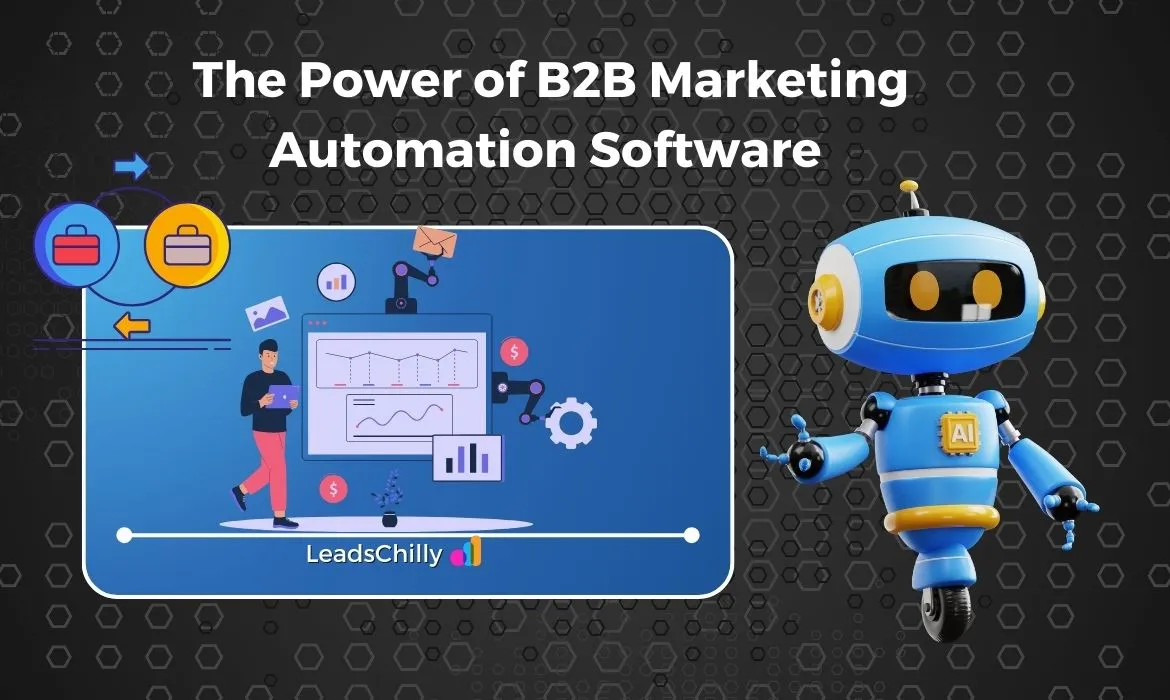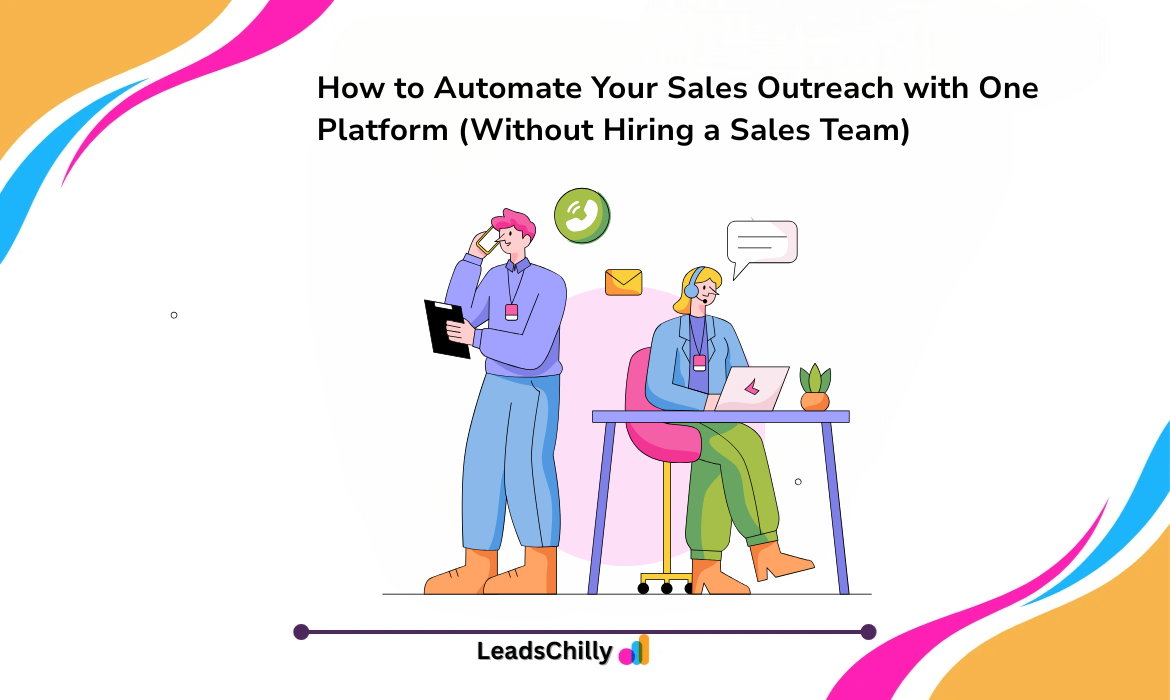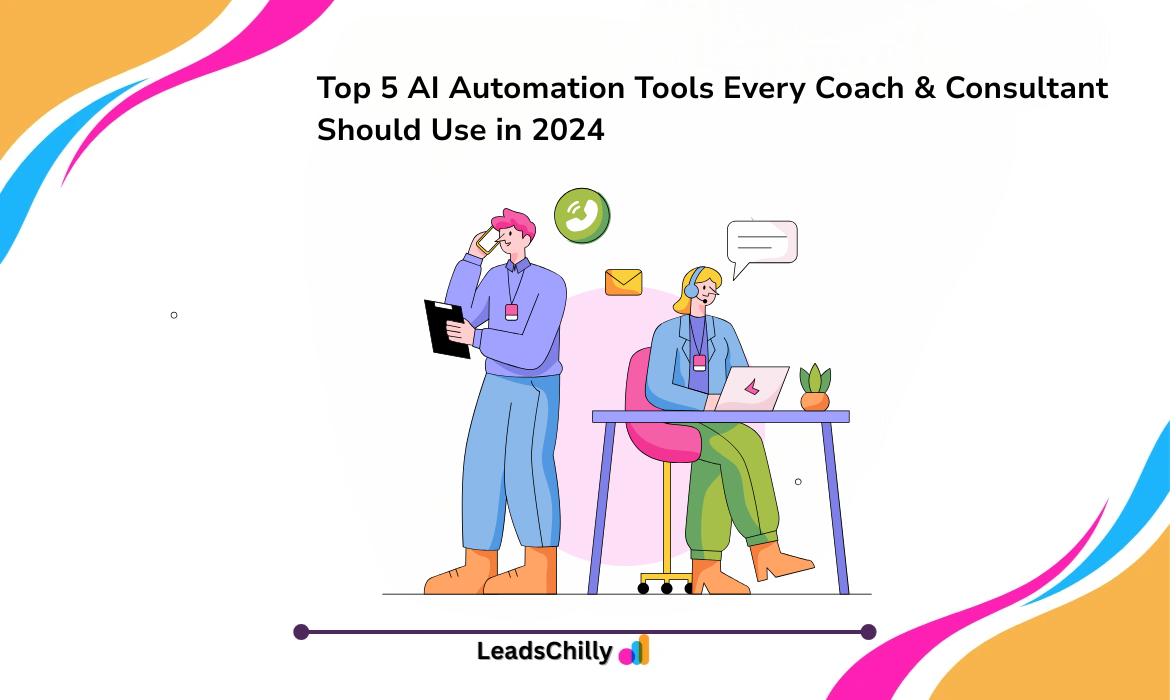According to Statista, “the marketing automation software industry is rapidly expanding, with a projected growth rate of 17.67% by 2027.” This growth highlights the increasing importance and demand for marketing automation tool, especially in the B2B sector. As digital channels evolve, businesses need to adapt to stay competitive. Marketing automation helps companies manage, optimize, and streamline their efforts, making it easier to reach and engage their target audience effectively.
Don’t get left behind in this fast-growing market. Start your journey with LeadsChilly’s marketing automation tools today. Sign up now for a 14-day free trial and see first hand how our software can transform your marketing strategy and drive your business growth.
If you’re still confused about adopting B2B marketing automation software, this guide will provide the insights you need to make an informed decision.
What is B2B Marketing Automation Software & Why Consider It Today?
B2B marketing automation software is designed to help businesses automate repetitive marketing tasks such as email campaigns, social media posting, and lead management. This software not only saves valuable time but also enhances the effectiveness of marketing campaigns by targeting the right audience at the right time.
The digital landscape is more competitive than ever. To stay ahead, businesses need to be agile and efficient. Marketing automation enables companies to achieve both by offering a range of tools and functionalities that streamline marketing processes and improve overall performance.
What is an Example of Marketing Automation?
One common example of marketing automation is automated email campaigns. With this tool, businesses can segment their audience, create personalized email sequences, and send targeted messages based on customer behavior and preferences. This process not only increases engagement but also boosts conversion rates by delivering relevant content to potential customers.
How Does Marketing Automation Work?
Marketing automation works by integrating multiple marketing channels into a single platform. Here’s how it functions:
- Data Collection: Gathers data from various sources, including website visits, social media interactions, and email responses.
- Segmentation: Categorizes prospects based on their behavior, interests, and demographics.
- Personalization: Creates personalized content tailored to each segment.
- Automation: Schedules and delivers content automatically across multiple channels.
- Analysis: Monitors performance, tracks conversions, and adjusts strategies in real-time.
How Can Marketing Automation Help Marketers?
B2B marketing automation software offers numerous benefits for marketers. Here are some key advantages:
1. Saves Valuable Time and Increases Conversions
By automating repetitive tasks, marketing teams can focus on strategic initiatives that drive growth. Automation tools handle tasks like email follow-ups, social media posting, and lead nurturing, allowing marketers to dedicate more time to creating high-impact strategies that boost conversions.
2. Improves Efficiency by Streamlining Processes
Marketing automation tools integrate various platforms and data sources, ensuring that all marketing efforts are aligned. This integration minimizes the risk of errors and ensures consistency across all channels, resulting in more efficient marketing processes.
3. Decreases the Possibility of Costly Human Error
Manual marketing processes are prone to mistakes, from sending emails to the wrong list to forgetting follow-ups. Automation significantly reduces these errors, ensuring that campaigns are executed flawlessly every time.
4. Increases Customer Capacity
Automation enables businesses to handle a larger customer base without compromising on service quality. By automating tasks like lead scoring and customer segmentation, marketers can manage more leads efficiently, ensuring that no opportunity is missed.
5. Eliminates Annoying and Repetitive Tasks
Marketers often find themselves bogged down with repetitive tasks that add little value. Marketing automation software takes care of these tasks, freeing up time for more creative and strategic activities.
Comparing Marketing Strategies: With vs. Without Marketing Automation
Here is a quick comparison of the impact on your business when using a marketing automation tool versus relying on traditional, manual marketing methods.
| Aspect | With Marketing Automation | Without Marketing Automation |
| Time Management | Automates repetitive tasks, saving time for strategic efforts. | Manual execution of tasks, consuming valuable time. |
| Personalization | Delivers personalized content based on customer behavior. | Limited ability to personalize messages at scale. |
| Customer Engagement | Consistent, timely communication across multiple channels. | Inconsistent communication; risk of missing key touchpoints. |
| Error Reduction | Minimizes human error through automated workflows. | High risk of manual errors, leading to potential losses. |
| Analytics and Reporting | Provides real-time insights for data-driven decision-making. | Limited analytics; decisions often based on assumptions. |
| Scalability | Easily scales with business growth without additional resources. | Difficult to scale; requires more staff and resources. |
| Cost Efficiency | Reduces overall marketing costs by optimizing resource use. | Higher costs due to manual processes and resource allocation. |
By leveraging a marketing automation tool, businesses can achieve greater efficiency, enhance customer engagement, and scale their marketing efforts effectively—all while reducing costs and minimizing errors. Embrace automation to unlock your business’s full potential!
Should Your Business Use Marketing Automation Platforms?
If you’re considering whether marketing automation is right for your business, ask yourself the following questions:
- Do you have repetitive marketing tasks that consume significant time?
- Are you struggling to manage a growing customer base?
- Is your marketing team overwhelmed with manual processes?
If the answer to any of these questions is “yes,” then adopting a marketing automation platform could be a game-changer for your business.
What Can Marketing Automation Do for You?
Marketing automation can:
- Enhance Lead Nurturing: By automating follow-up emails and nurturing sequences, you ensure that leads are consistently engaged until they are ready to convert.
- Improve Customer Retention: Automated workflows can help maintain customer relationships through regular, personalized communication.
- Optimize Marketing Spend: Automation tools provide insights into campaign performance, allowing you to allocate resources more effectively.
- Support Sales Teams: Automation bridges the gap between marketing and sales, ensuring that sales teams receive high-quality, nurtured leads ready for conversion.
Final Thoughts: Unlock the Power of B2B Marketing Automation Software Today!
B2B marketing automation software is more than just a tool; it’s a strategy that can transform your business. Whether you’re a small to medium-sized business (SMB) or a large marketing agency, automation can streamline processes, reduce costs, and increase efficiency. The key is to understand its capabilities, avoid common pitfalls, and align your efforts with your business goals.
Supercharge Your Marketing and Sales with LeadsChilly
Looking to capture, nurture, and convert leads effortlessly? LeadsChilly offers an all-in-one marketing and sales automation platform with AI-powered tools to help you grow your business.
- Capture Leads: Utilize landing pages, forms, and calendars to efficiently capture leads.
- Nurture Leads: Automate engagement across channels like voicemail, SMS, emails, and social media.
- Convert Leads: Optimize your sales process with our comprehensive tools for transactions and analytics.
Sign up with LeadsChilly today and take your business to the next level!
Frequently Asked Questions
Q1. Why is marketing automation important for B2B businesses?
Marketing automation is crucial for B2B businesses because it allows them to efficiently manage and optimize their marketing campaigns across multiple digital channels. It helps in targeting the right audience, nurturing leads, and improving conversion rates, which is especially important in the competitive B2B sector.
Q2. How does marketing automation software impact ROI?
Marketing automation software can significantly improve ROI by streamlining marketing processes, reducing manual tasks, and enabling more personalized and timely communication with potential customers. This leads to higher engagement, better lead nurturing, and ultimately more conversions.
Q3. What are the key features to look for in B2B marketing automation software?
When choosing B2B marketing automation software, key features to consider include lead scoring, email marketing automation, CRM integration, analytics and reporting, and multi-channel campaign management. These features help businesses to effectively manage and optimize their marketing strategies.
Q4. How does the projected growth of the marketing automation industry affect my business?
The projected growth of the marketing automation industry, with a CAGR of 17.67% by 2027, indicates that more businesses are adopting these tools to stay competitive. By investing in marketing automation now, your business can stay ahead of the curve and take advantage of the latest technology to drive growth.
Q5. Is it worth starting with a free trial of marketing automation software?
Absolutely! Starting with a free trial allows you to explore the features and benefits of the software without any commitment. It’s a great way to see how the tool can fit into your marketing strategy and help you achieve your business goals before making a full investment.




Comments are closed.